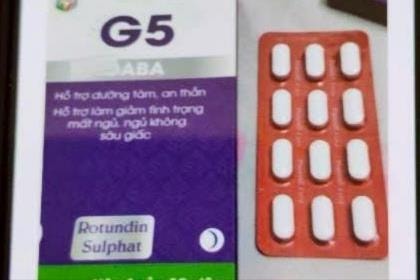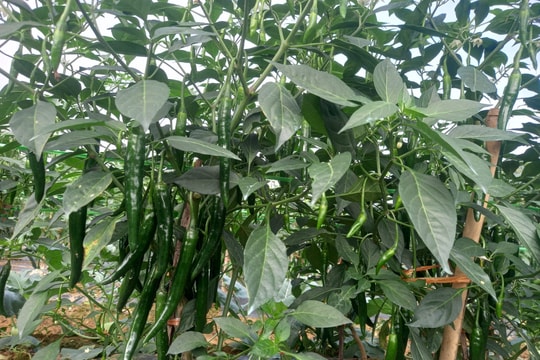Squid fishing season, 'fishermen' earn millions every night in Nghe An
(Baonghean.vn) - Duc Hau village (now hamlet 9), Dien Thinh commune, Dien Chau is famous for its seafood fishing with drag nets, dragon nets, and bag nets. In recent years, squid fishing has brought high income to fishermen.
Although squid fishing is hard work, having to stay up all night, in return, when arriving at the dock, there are traders waiting to collect goods. Currently, each kilogram of "flashing" squid at the dock costs 220,000 - 300,000 VND/kg, depending on the size of each fish; calculating that for one night of squid fishing, the "fishermen" can earn from 1 - 1.5 million VND. The squid fishing season lasts 3 - 4 months, each "fisherman" earns an average of 50 - 60 million VND/season.
Mr. Hoang Thuy, a famous squid fisherman in Duc Hau village, said that three years ago, only he and his father went squid fishing, then a few people in the village also boldly took up the profession. Thanks to working far away, the young brothers learned the secret of squid fishing in Phu Quoc and then returned to teach the craft to the fishermen in the village.
 |
| Squid products of Mr. Hoang Thuy in Dien Thinh commune (Dien Chau). Photo: Tran Canh Yen |
Squid fishing brings in high income, while investing in fishing gear is not as expensive as other professions. A raft with a ten-horsepower engine, a few dozen clusters of hooks and a battery with five or seven light bulbs is enough to go to sea.
Coming to Duc Hau village in the middle of squid fishing season, you will see the bustling scene on the wharf and under the boats at dusk and dawn. In the afternoon, when the sun is about to set, the scene of pushing rafts into the sea. The raft is supported by a set of tires, the husband drives a cart in front of the raft, the wife and children help push from behind. The sound of motorbikes revving, the cheers calling each other make the whole area of the seaport noisy.
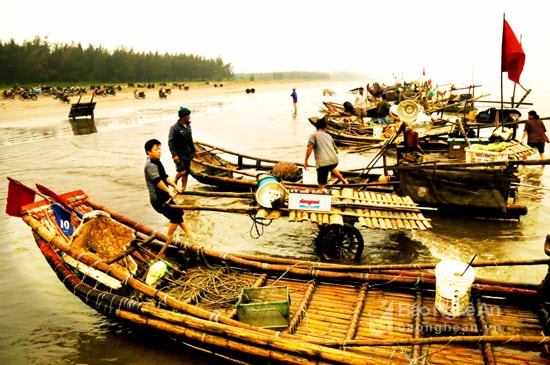 |
| Squid fishing provides fishermen in Duc Hau fishing village with a relatively stable income. Photo: Tran Canh Yen |
After a sleepless night of squid fishing, at dawn, dozens of fishing rafts turned around and sped back to the mainland. At this time, Duc Hau village's port was busier with the work of cleaning up fishing gear, jacking up and pushing the rafts onto land; women quickly brought the "flashing" squid products to traders and seafood restaurants to ensure freshness. Only then did the "fishermen" have time to relax, then take a nap until the afternoon to start preparing for a new "squid fishing" session.
Mr. Hoang Thuy shared the secret of the profession: "The only tools for fishing are a fishing rod with a reel of fishing line, the fake bait is a lead bar with sharpened iron hooks used as hooks, wrapped around with reflective glitter wire, when dropped into the sea it will glow under the headlights and attract squid closer. The time when squid eat the most is around dark. You have to know how to look at the moon, the water flow, the technique of digging and pulling the line to ensure the squid is hooked. And how to pull the squid up to avoid wasting effort is also a technique."
 |
| In addition to the techniques and art of dropping the line and pulling out the bait, squid catching also requires understanding the flow of the beach and having bright enough lights to attract the squid to eat the bait. Photo: Dao Tuan |
With decades of experience drifting in the open sea, according to Mr. Sau Dao, squid have 10 tentacles but only the 2 longest ones are effective in holding on. When the squid gets stuck to the bait, if you pull it too quickly, the tentacles can break and the squid will lose its "food". This job is sometimes lucky and sometimes unlucky, sometimes you can earn millions of dong in one night, but there are also times when you can't catch anything until morning because of rough water.
Each "batch" of sea fishing brings back a raft of about 5-7 kg of squid, and the rafts that are lucky enough to find a beach can catch 10-15 kg. The squid are kept in cages, and when brought ashore, they are still alive, with the star-shaped layer on their bodies blinking and changing color. That is why fishermen often call caught squid "blinking" squid to make it more attractive to diners.
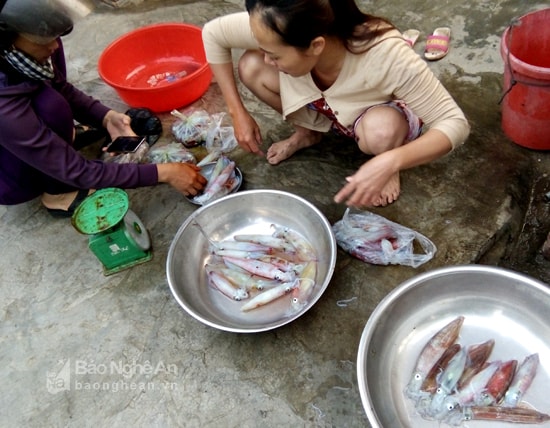 |
| "Flashing" ink is always sought after by customers at high prices. Photo: Tran Canh Yen |
According to Ms. Cao Thi Vinh, head of hamlet 9, Dien Thinh commune, thanks to squid fishing combined with other seafood catching jobs such as dragnets, trawl nets, and shrimp scooping on stilts, people here have a relatively stable income; their lives are constantly improving and significantly improving.
Tran Canh Yen
| RELATED NEWS |
|---|

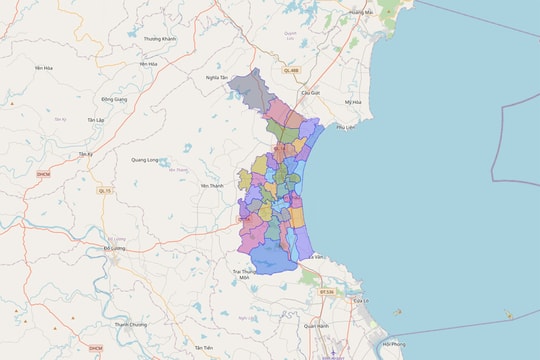
.jpg)

